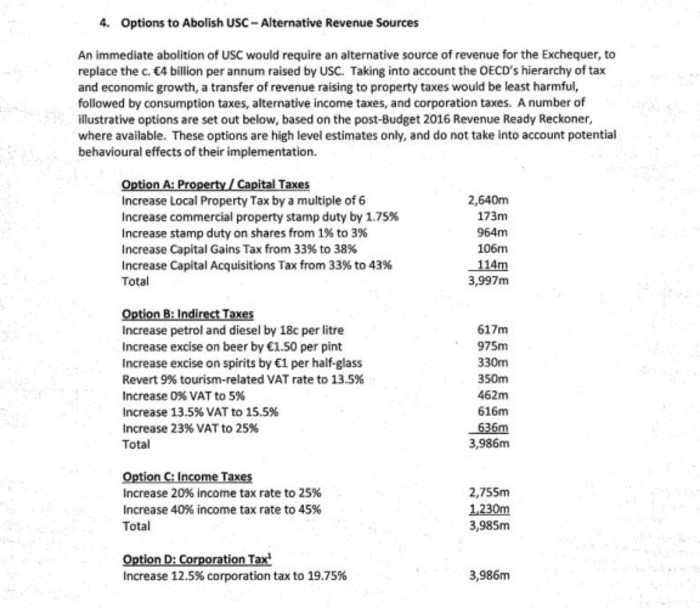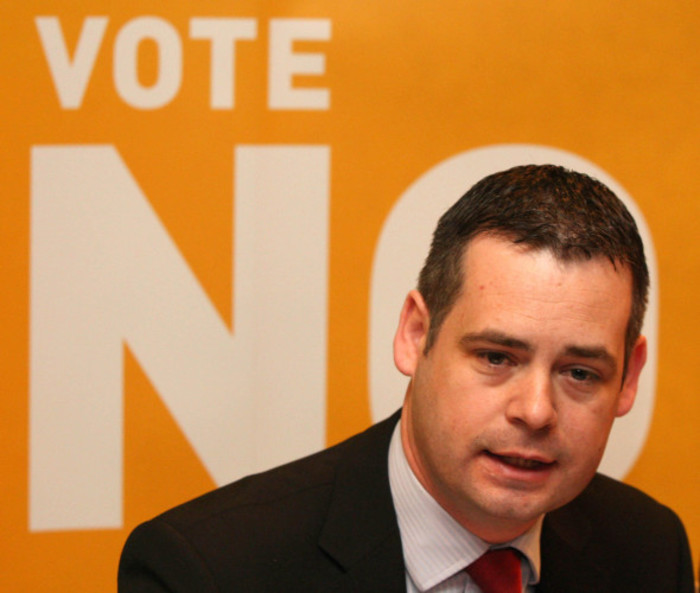Scrapping the USC could force a 600% increase in property tax
Increases in excise on petrol, diesel and alcohol have also been flagged to make up the shortfall.
SCRAPPING THE UNIVERSAL Social Charge (USC) could lead to an increase in the Local Property Tax of 600%, new documents released under Freedom of Information legislation show.
The Department of Finance document, which can be viewed here, released to Sinn Féin’s Pearse Doherty, outline proposed tax measures that could make up the shortfall from abolishing the much-maligned charge.
The main document released is a briefing note prepared for an incoming government prior to the general election last February.
That document warns that the abolition of the USC in its entirety would be a “regressive” move, given that the USC itself is a “progressive” tax – and that other alternatives would have to be considered.
Four such alternatives are posited in the document:
- Increased take on property and capital taxes, including increasing Local Property Tax by a factor of six, and increasing stamp duty on shares
- An increase in indirect taxes including VAT and excise on petrol and diesel (by €0.18 per litre), and beer (by €1.50 per pint)
- Increasing income tax in different brackets from 20% to 25% and 40% to 45%
- Increasing corporation tax from 12.5% to 19.75%
None of the four options could be considered palatable, with each likely to spark voter outrage.

Click here to view a larger image
While corporation tax may ostensibly have the least impact, at least at face value, on the average taxpayer, Ireland’s low rate of corporation tax is widely accepted as being instrumental in attracting multinational companies to base their operations here.
However a spokesman for the Department of Finance said the information in the tax paper “predates the Programme for Government” and was “not relevant in the present context”.
He said the government’s ‘income tax reform plan’ included a number of options for the gradual phasing out of the USC.
“There is absolutely no intention to increase property tax in the forthcoming Budget,” he said.
Shocking
Speaking on RTÉ’s Morning Ireland, Doherty described the alternatives detailed in the document as “shocking”.
Prior to February’s election, Sinn Féin had possibly the most moderate policy for doing away with the USC, with a suggestion that anyone earning less than €19,000 annually should be exempt. By contrast, Fine Gael suggested that the charge be gradually phased out entirely but with a clawback arrangement for high-income earners.
“It’s clear from these documents that the Department of Finance has been doing its job in warning the government against completely abolishing USC,” said Doherty.
“Removing the charge entirely will leave the country at risk in terms of its tax strategy. The four options available are shocking – no-one will want to pay an increase of 600% in LPT, and that is just one of five avenues that would have to be taken.”
 Sinn Féin's Pearse Doherty
Sinn Féin's Pearse Doherty
Doherty suggested that his own party’s election promise to make workers on salaries of under €19,500 exempt from USC – which he said would cost less than €100 million – has been “vindicated” by the released documents.
He also said Ireland’s reliance on corporate tax takings, which were “volatile”, was the “height of stupidity”.
Around four-fifths of the country’s windfall corporate tax revenues last year came from multinationals, with a few large firms accounting for a disproportionate share of the total.
Excise hike
Meanwhile, the drinks industry branded the suggestion of further increasing the excise on beer or spirits as a “ludicrous proposition” with the rate of the duty in the Republic already among the highest in the EU.
Vintners Federation Ireland CEO Padriag Cribben said: “We should be looking for a decrease in Ireland’s punitive excise rates as opposed to flying kites about job-killing taxes.”
Note: This article has been updated to include comments from the Department of Finance
Written by Cianan Brennan with additional reporting by Peter Bodkin






